- Home
- Neal Stephenson
Anathem
Anathem Read online
Anathem
Neal Stephenson
TO MY PARENTS
Contents
Note to the Reader
[ Part 1 ] Provener
[ Part 2 ] Apert
[ Part 3 ] Eliger
[ Part 4 ] Anathem
[ Part 5 ] Voco
[ Part 6 ] Peregrin
[ Part 7 ] Feral
[ Part 8 ] Orithena
[ Part 9 ] Inbrase
[ Part 10 ] Messal
[ Part 11 ] Advent
[ Part 12 ] Requiem
[ Part 13] Reconstitution
Glossary
Calca 1: Cutting the Cake
Calca 2: Hemn (Configuration) Space
Calca 3: Complex Versus Simple Protism
Acknowledgments
About the Author
Other Books by Neal Stephenson
Credits
Copyright
About the Publisher
Anathem: (1) In Proto-Orth, a poetic or musical invocation of Our Mother Hylaea, which since the time of Adrakhones has been the climax of the daily liturgy (hence the Fluccish word Anthem meaning a song of great emotional resonance, esp. one that inspires listeners to sing along). Note: this sense is archaic, and used only in a ritual context where it is unlikely to be confused with the much more commonly used sense 2. (2) In New Orth, an aut by which an incorrigible fraa or suur is ejected from the math and his or her work sequestered (hence the Fluccish word Anathema meaning intolerable statements or ideas). See Throwback.
—THE DICTIONARY, 4th edition, A.R. 3000
NOTE TO THE READER
IF YOU ARE ACCUSTOMED to reading works of speculative fiction and enjoy puzzling things out on your own, skip this Note. Otherwise, know that the scene in which this book is set is not Earth, but a planet called Arbre that is similar to Earth in many ways.
Pronunciation hints: Arbre is pronounced like “Arb” with a little something on the end. Consult a French person for advice. In a pinch, “Arb” will do. Two dots above a vowel are a dieresis, meaning that the vowel in question gets a syllable all its own. So, for example, Deät is pronounced “day ott” rather than “deet.”
Arbran measurement units have been translated into ones used on Earth. This story takes place almost four thousand years after the people of Arbre settled on their common system of units, which now seem ancient and time-worn to them. Accordingly, old Earth units (feet, miles, etc.) are used here instead of the newer ones from the metric system.
Where the Orth-speaking culture of this book has developed vocabulary based on the ancient precedents of Arbre, I have coined words based on the old languages of Earth. Anathem is the first and most conspicuous example. It is a play on the words anthem and anathema, which derive from Latin and Greek words. Orth, the classical language of Arbre, has a completely different vocabulary, and so the words for anthem, anathema, and anathem are altogether different, and yet linked by a similar pattern of associations. Rather than use the Orth word, which would be devoid of meaning and connotations to Earth readers, I have tried to devise an Earth word that serves as its rough equivalent while preserving some flavor of the Orth term. The same thing, mutatis mutandis, has been done in many other places in the book.
Names of some Arbran plant and animal species have been translated into rough Earth equivalents. So these characters may speak of carrots, potatoes, dogs, cats, etc. This doesn’t mean that Arbre has exactly the same species. Naturally, Arbre has its own plants and animals. The names of those species’ rough Earth equivalents have been swapped in here to obviate digressions in which, e.g., the phenotype of the Arbre-equivalent-of-a-carrot must be explained in detail.
A very sparse chronology of Arbre’s history follows. None of this will make very much sense until one has read some pages into the book, but after that it may be useful for reference.
-3400 TO-3300:
Approximate era of Cnoüs and his daughters Deät and Hylaea.
-2850:
Temple of Orithena founded by Adrakhones, the father of geometry.
-2700:
Diax drives out the Enthusiasts, founds theorics on axiomatic principles and gives it its name.
-2621:
Orithena destroyed by volcanic eruption. Beginning of Peregrin period. Many surviving theors gravitate toward city-state of Ethras.
-2600 TO-2300:
Golden Age of Ethras.
-2396:
Execution of Thelenes
-2415 TO-2335:
Life span of Protas
-2272:
Ethras forcibly absorbed into Bazian Empire
-2204:
Foundation of the Ark of Baz
-2037:
Ark of Baz becomes state religion of the Empire
-1800:
Bazian Empire reaches its peak
-1500S:
Various military setbacks lead to dramatic shrinkage of the Bazian Empire. Theors retreat from public life. Saunt Cartas writes Saeculum thereby inaugurating the Old Mathic Age.
-1472:
Fall of Baz, burning of its Library. Surviving literate people flock to Bazian monasteries or Cartasian maths.
-1150:
Rise of the Mystagogues
-600:
The Rebirth. Purging of the Mystagogues, Opening of the Books.
-500:
Dispersal of the mathic system, Age of Exploration, discovery of laws of dynamics, creation of modern applied theorics. Beginning of the Praxic Age.
-74:
The First Harbinger
-52:
The Second Harbinger
-43:
Proc founds The Circle
-38:
Proc’s work repudiated by Halikaarn
-12:
The Third Harbinger
-5:
The Terrible Events
0:
The Reconstitution. The First Convox. Foundation of the new mathic system. Promulgation of the Book of Discipline and the first edition of the Dictionary.
+ 121:
Avout of the Concent of Saunt Muncoster split into two groups, the Syntactics and the Semantics, founding the Procian and Halikaarnian Orders respectively. Thereafter, orders proliferate.
+ 190 TO + 210:
Avout of Saunt Baritoe make advances in manipulation of nucleosynthesis using syntactic techniques. Creation of New Matter.
+ 211 TO + 213:
The First Sack
+ 214:
Post-Sack Convox abolishes most forms of New Matter. Promulgation of the Revised Book of Discipline. Faanian order splits away from Procian. Evenedrician order splits away from Halikaarnian.
+ 297:
Saunt Edhar establishes his own order out of the Evenedricians.
+ 300:
At the Centennial Apert, it is found that several Centenarian maths have gone off the rails (“gone Hundred”) since 200.
+ 308:
Saunt Edhar founds the Concent of the same name.
+ 320 TO + 360:
Advances in praxis of genetic sequences made at various concents, frequently arising from collaboration between Faanians and Halikaarnians.
+ 360 TO + 366:
Second Sack.
+ 367:
Post-Sack Convox. Manipulation of genetic sequences abolished. Sharper lines drawn between syntactic and semantic orders. Faanians disbanded. New Revised Book of Discipline promulgated. Syntactic devices removed from the mathic world. The Ita are created; many ex-Faanians join them. The Inquisition is created as a means of enforcing the new rules. Wardens Regulant installed in all concents; modern system of hierarchs instituted in the form that will endure for at least the next three millennia.
+ 1000:
First Millennial Convox
+ 1107
TO
Detection of a dangerous asteroid (the “Big
+ 1115:
Nugget”) prompts the Saecular Power to summon an extraordinary Convox.
+ 2000:
Second Millennial Convox
+ 2700:
Growing rivalry between Procian and Halikaarnian Orders gives rise to Saecular legends of the Rhetors and the Incanters.
+ 2780:
During a Decennial Apert, the Saecular Power becomes aware of extraordinary kinds of praxis being developed by Rhetors and Incanters.
+ 2787 TO
Third Sack depopulates all concents except for
+ 2856:
the Three Inviolates.
+ 2857:
Post-Sack Convox reorganizes the concents. Dowments outlawed. Various measures taken to reduce perceived luxury of mathic life. Number of Orders reduced. Remaining Orders redistributed to bring about greater “balance” between Procian and Halikaarnian tendencies. Promulgation of the Second New Revised Book of Discipline.
+ 3000:
Third Millennial Convox
+ 3689:
Our story opens.
Part 1
PROVENER
Extramuros: (1) In Old Orth, literally “outside the walls.” Often used in reference to the walled city-states of that age. (2) In Middle Orth, the non-mathic world; the turbulent and violent state of affairs that prevailed after the Fall of Baz. (3) In Praxic Orth, geographical regions or social classes not yet enlightened by the resurgent wisdom of the mathic world. (4) In New Orth, similar to sense 2 above, but often used to denote those settlements immediately surrounding the walls of a math, implying comparative prosperity, stability, etc.
—THE DICTIONARY, 4th edition, A.R. 3000
Do your neighbors burn one another alive?” was how Fraa Orolo began his conversation with Artisan Flec.
Embarrassment befell me. Embarrassment is something I can feel in my flesh, like a handful of sun-warmed mud clapped on my head.
“Do your shamans walk around on stilts?” Fraa Orolo asked, reading from a leaf that, judging by its brownness, was at least five centuries old. Then he looked up and added helpfully, “You might call them pastors or witch doctors.”
The embarrassment had turned runny. It was horrifying my scalp along a spreading frontier.
“When a child gets sick, do you pray? Sacrifice to a painted stick? Or blame it on an old lady?”
Now it was sheeting warm down my face, clogging my ears and sanding my eyes. I could barely hear Fraa Orolo’s questions: “Do you fancy you will see your dead dogs and cats in some sort of afterlife?”
Orolo had asked me along to serve as amanuensis. It was an impressive word, so I’d said yes.
He had heard that an artisan from extramuros had been allowed into the New Library to fix a rotted rafter that we could not reach with our ladders; it had only just been noticed, and we didn’t have time to erect proper scaffolding before Apert. Orolo meant to interview that artisan, and he wanted me to write down what happened.
Through drizzly eyes, I looked at the leaf in front of me. It was as blank as my brain. I was failing.
But it was more important to take notes of what the artisan said. So far, nothing. When the interview had begun, he had been dragging an insufficiently sharp thing over a flat rock. Now he was just staring at Orolo.
“Has anyone you know ever been ritually mutilated because they were seen reading a book?”
Artisan Flec closed his mouth for the first time in quite a while. I could tell that the next time he opened it, he’d have something to say. I scratched at the edge of the leaf just to prove that my quill had not dried up. Fraa Orolo had gone quiet, and was looking at the artisan as if he were a new-found nebula in the eyepiece of a telescope.
Artisan Flec asked, “Why don’t you just speel in?”
“Speel in,” Fraa Orolo repeated to me, a few times, as I was writing it down.
I spoke in bursts because I was trying to write and talk at the same time: “When I came—that is, before I was Collected—we—I mean, they—had a thing called a speely…We didn’t say ‘speel in’—we said ‘cruise the speely.’” Out of consideration for the artisan, I chose to speak in Fluccish, and so this staggering drunk of a sentence only sounded half as bad as if I’d said it in Orth. “It was a sort of—”
“Moving picture,” Orolo guessed. He looked to the artisan, and switched to Fluccish. “We have guessed that ‘to speel in’ means to partake of some moving picture praxis—what you would call technology—that prevails out there.”
“Moving picture, that’s a funny way to say it,” said the artisan. He stared out a window, as if it were a speely showing a historical documentary. He quivered with a silent laugh.
“It is Praxic Orth and so it sounds quaint to your ears,” Fraa Orolo admitted.
“Why don’t you just call it by its real name?”
“Speeling in?”
“Yeah.”
“Because when Fraa Erasmas, here, came into the math ten years ago, it was called ‘cruising the speely’ and when I came in almost thirty years ago we called it ‘Farspark.’ The avout who live on the other side of yonder wall, who celebrate Apert only once every hundred years, would know it by some other name. I would not be able to talk to them.”
Artisan Flec had not taken in a word after Farspark. “Farspark is completely different!” he said. “You can’t watch Farspark content on a speely, you have to up-convert it and re-parse the format….”
Fraa Orolo was as bored by that as the artisan was by talk of the Hundreders, and so conversation thudded to a stop long enough for me to scratch it down. My embarrassment had gone away without my noticing it, as with hiccups. Artisan Flec, believing that the conversation was finally over, turned to look at the scaffolding that his men had erected beneath the bad rafter.
“To answer your question,” Fraa Orolo began.
“What question?”
“The one you posed just a minute ago—if I want to know what things are like extramuros, why don’t I just speel in?”
“Oh,” said the artisan, a little confounded by the length of Fra Orolo’s attention span. I suffer from attention surplus disorder, Fraa Orolo liked to say, as if it were funny.
“First of all,” Fraa Orolo said, “we don’t have a speely-device.”
“Speely-device?”
Waving his hand as if this would dispel clouds of linguistic confusion, Orolo said, “Whatever artifact you use to speel in.”
“If you have an old Farspark resonator, I could bring you a down-converter that’s been sitting in my junk pile—”
“We don’t have a Farspark resonator either,” said Fraa Orolo.
“Why don’t you just buy one?”
This gave Orolo pause. I could sense a new set of embarrassing questions stacking up in his mind: “do you believe that we have money? That the reason we are protected by the Saecular Power is because we are sitting on a treasure hoard? That our Millenarians know how to convert base metals to gold?” But Fraa Orolo mastered the urge. “Living as we do under the Cartasian Discipline, our only media are chalk, ink, and stone,” he said. “But there is another reason too.”
“Yeah, what is it?” demanded Artisan Flec, very provoked by Fraa Orolo’s freakish habit of announcing what he was about to say instead of just coming out and saying it.
“It’s hard to explain, but, for me, just aiming a speely input device, or a Farspark chambre, or whatever you call it…”
“A speelycaptor.”
“…at something doesn’t collect what is meaningful to me. I need someone to gather it in with all their senses, mix it round in their head, and make it over into words.”
“Words,” the artisan echoed, and then aimed sharp looks all round the library. “Tomorrow, Quin’s coming instead of me,” he announced, then added, a little bit defensively, “I have to counter-strafe the new clanex recompensators—the fan-out tree’s starting to look a bit clumpy,
if you ask me.”
“I have no idea what that means,” Orolo marveled.
“Never mind. You ask him all your questions. He’s got the gift of gab.” And for the third time in as many minutes, the artisan looked at the screen of his jeejah. We’d insisted he shut down all of its communications functions, but it still served as a pocket-watch. He didn’t seem to realize that in plain sight out the window was a clock five hundred feet high.
I put a full stop at the end of the sentence and aimed my face at a bookshelf, because I was afraid that I might look amused. There was something in the way he’d said Quin’s coming instead of me that made it seem he’d just decided it on the spot. Fraa Orolo had probably caught it too. If I made the mistake of looking at him, I would laugh, and he wouldn’t.
The clock began chiming Provener. “That’s me,” I said. Then I added, for the benefit of the artisan: “Apologies, I must go wind the clock.”
“I was wondering—” he said. He reached into his toolbox and took out a poly bag, blew off sawdust, undid its seal (which was of a type I had never seen before), and withdrew a silver tube the size of his finger. Then he looked at Fraa Orolo hopefully.

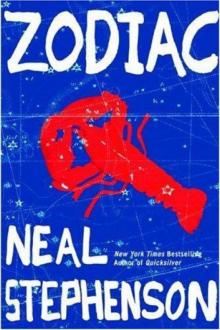 Zodiac: The Eco-Thriller
Zodiac: The Eco-Thriller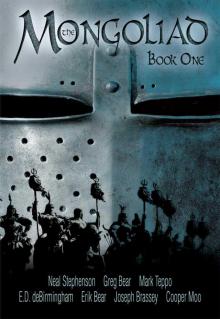 The Mongoliad: Book One
The Mongoliad: Book One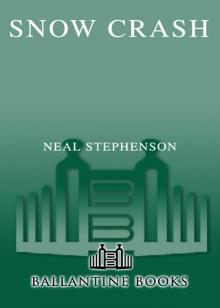 Snow Crash
Snow Crash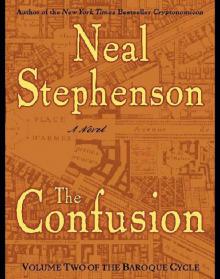 The Confusion: Volume Two of the Baroque Cycle
The Confusion: Volume Two of the Baroque Cycle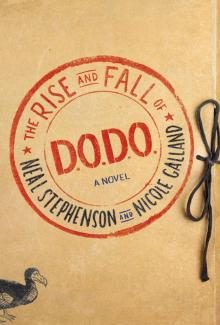 The Rise and Fall of D.O.D.O.
The Rise and Fall of D.O.D.O.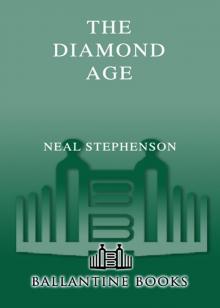 The Diamond Age: Or, a Young Lady's Illustrated Primer
The Diamond Age: Or, a Young Lady's Illustrated Primer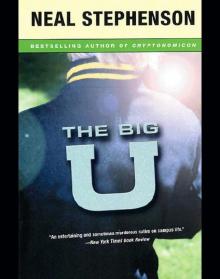 The Big U
The Big U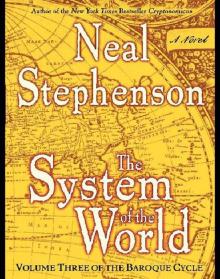 The System of the World: Volume Three of the Baroque Cycle
The System of the World: Volume Three of the Baroque Cycle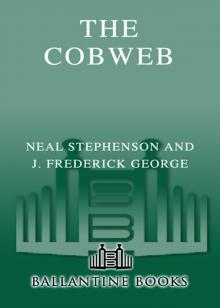 The Cobweb
The Cobweb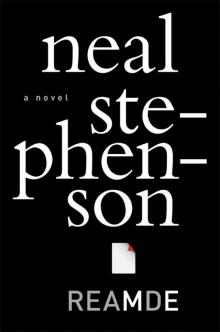 Reamde
Reamde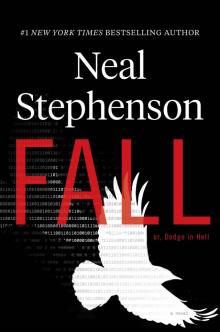 Fall; or, Dodge in Hell
Fall; or, Dodge in Hell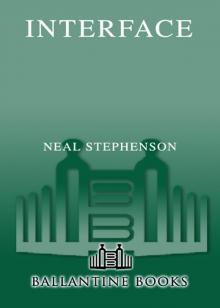 Interface
Interface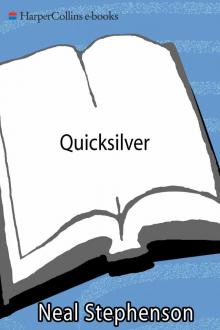 Quicksilver
Quicksilver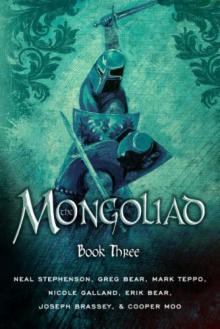 The Mongoliad: Book Three
The Mongoliad: Book Three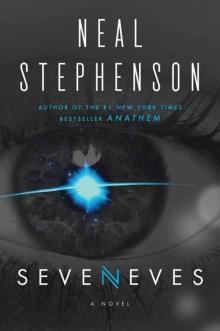 Seveneves
Seveneves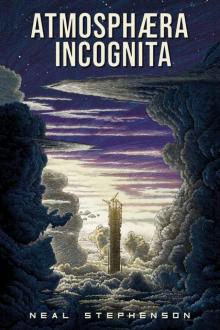 Atmosphæra Incognita
Atmosphæra Incognita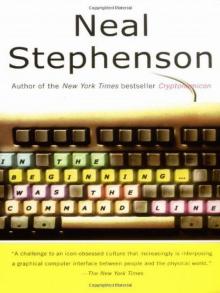 In the Beginning...Was the Command Line
In the Beginning...Was the Command Line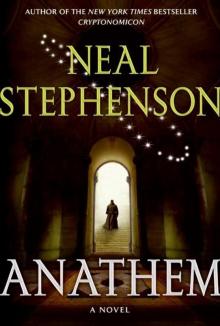 Anathem
Anathem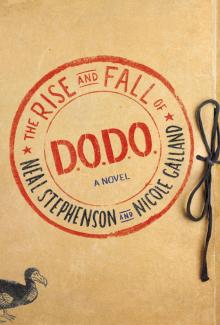 The Rise and Fall of D.O.D.O.: A Novel
The Rise and Fall of D.O.D.O.: A Novel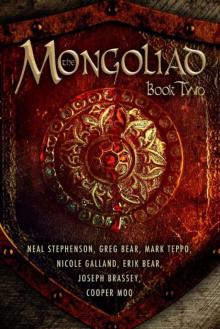 The Mongoliad: Book Two
The Mongoliad: Book Two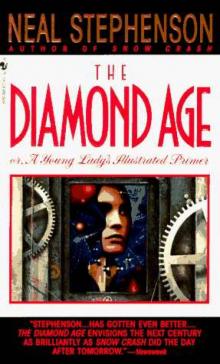 Diamond Age or a Young Lady's Illustrated Primer
Diamond Age or a Young Lady's Illustrated Primer THE System OF THE WORLD
THE System OF THE WORLD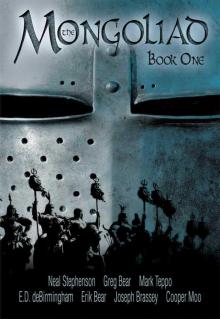 The Mongoliad: Book One tfs-1
The Mongoliad: Book One tfs-1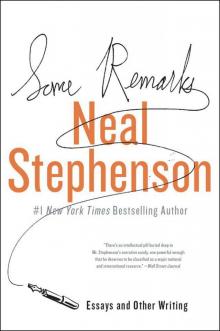 Some Remarks: Essays and Other Writing
Some Remarks: Essays and Other Writing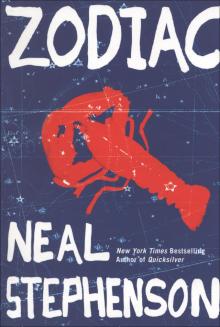 Zodiac
Zodiac Spew
Spew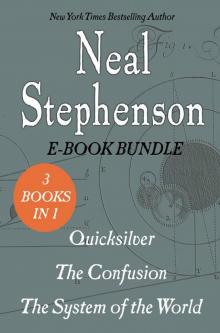 The Baroque Cycle: Quicksilver, the Confusion, and the System of the World
The Baroque Cycle: Quicksilver, the Confusion, and the System of the World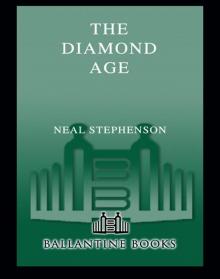 The Diamond Age
The Diamond Age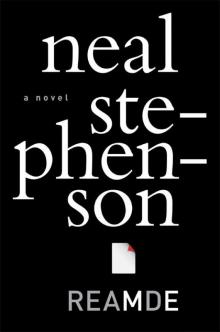 Reamde: A Novel
Reamde: A Novel In the Kingdom of Mao Bell
In the Kingdom of Mao Bell Mother Earth Mother Board
Mother Earth Mother Board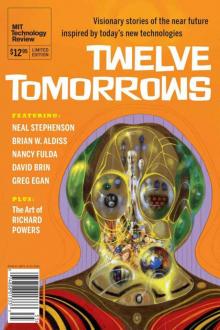 Twelve Tomorrows - Visionary stories of the near future inspired by today's technologies
Twelve Tomorrows - Visionary stories of the near future inspired by today's technologies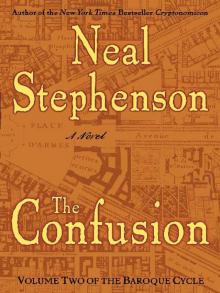 The Confusion
The Confusion The Great Simoleon Caper
The Great Simoleon Caper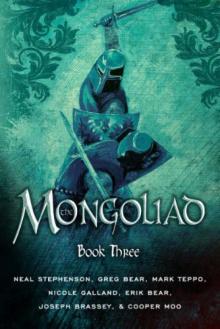 The Mongoliad: Book Three tfs-3
The Mongoliad: Book Three tfs-3